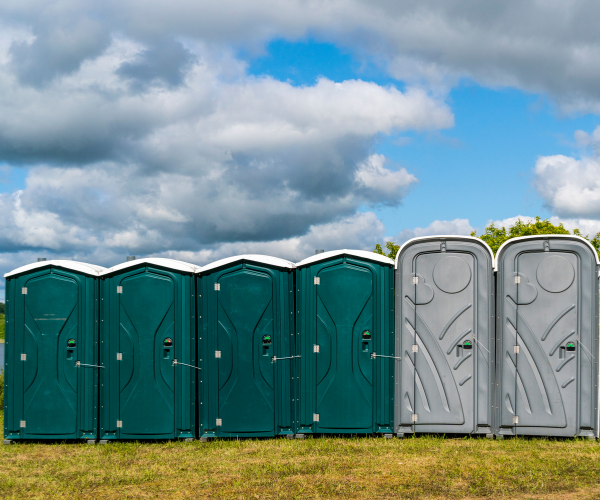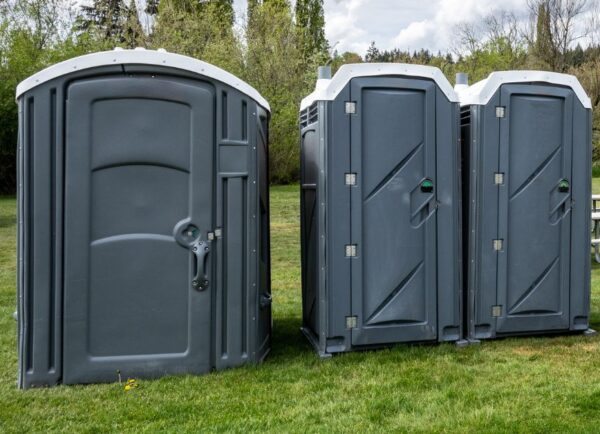Using portable toilets is an eco-friendly choice due to their design and functionality, which significantly minimizes environmental impact. First, portable toilets conserve water because they require no flushing, saving thousands of liters of water compared to traditional restrooms. This conservation is crucial in areas prone to drought or where water resources are limited. Furthermore, portable toilets are equipped with sealed waste tanks that contain chemicals specifically formulated to break down waste, minimizing odors and reducing environmental contamination. These chemicals are environmentally safe and designed to facilitate efficient waste processing.Another substantial benefit is the reduction in sewage and waste management demands. Since portable toilets store waste independently, they alleviate the strain on sewage systems, especially in areas without direct access to municipal waste facilities. This ability to process waste on-site aids in maintaining local waterways and soil integrity by preventing potential contamination.Portable toilets are also conducive to sustainability efforts. Many units are constructed from recycled or recyclable materials, enhancing their eco-friendly footprint. Additionally, service providers often optimize logistics, minimizing the carbon footprint associated with transporting the units to and from events. By deploying portable toilets strategically, event organizers can effectively manage waste, making them invaluable for outdoor settings like festivals, construction sites, and nature areas.In summary, portable toilets offer significant ecological advantages by conserving water, protecting waterways from contamination, reducing dependence on sewage infrastructure, and minimizing waste management logistics. Their design and operative efficiency help promote sustainable practices, making them a practical choice for environmentally-conscious individuals and communities.

Portable Toilet Rentals in Coweta County, Georgia
Call today for a free quote (770) 215-0134
Portable Toilet
Fast, Easy, & 100% Free To Get Started
Decades of Expertise
With over 30 years of experience, our portable toilet company in Coweta County offers unparalleled quality and a deep commitment to community satisfaction. We stand as a beacon of reliability and dedication, ensuring each customer receives top-tier service crafted to their specific needs.
Excellence in Service
We prioritize quality service by delivering clean, well-maintained portable toilets that meet the highest standards of sanitation and customer satisfaction. Our team is dedicated to exceeding expectations and ensuring that every client receives the best possible experience with each rental.
Swift Delivery Service
Our commitment to quick delivery sets us apart, ensuring portable toilets arrive promptly to meet your event or project timelines. We prioritize your schedule, providing timely service without compromising on quality or convenience.
Portable Toilet Solutions in Coweta County
Call for a Free Quote Today
(770) 215-0134
Our premium portable toilet services in Coweta County, Georgia, ensure convenience and comfort for any occasion. As a locally owned company, we pride ourselves on being dependable and reliable, always striving to meet the needs of our community. Whether you are planning a construction site, a festive party, a bustling festival, or a beautiful wedding, our portable toilets are designed to accommodate your guests with ease. Serving not just Coweta County but also surrounding areas, we are the go-to choice for exceptional service and portable sanitation solutions. Our reputation is built on trust and professionalism, laying the groundwork for a seamless experience every time.


Our standard porta john rental units are durable and reliable for any commercial build site, housing development, public works project, or remodel job.Features include dome lighting, grated floors, and an “In-Use” locking mechanism for privacy and comfort. Regularly maintained, inspected, and cleaned by FusionSite at your location.

Developed as an alternative to full ADA-compliant restrooms, the Liberty is a spacious, wheelchair-accessible unit that can also be promoted as a family-sized restroom. Includes a patented flat-floor system for easy wheelchair access and maneuverability.Handrails, paper holder, and rotary latch are designed for simple, intuitive end-user operation.

Portable hand washing stations are essential for keeping your work site sanitary and clean. Features hands-free foot pumps, liquid soap, and paper towels.Perfect for job sites without water hookups, these units can handle hundreds of washes between services.
We Proudly Serve
Standard Portable Toilets
Standard Portable Toilets in Georgia offer reliable and sanitary solutions for outdoor events.
High Rise Portable Toilets
High Rise Portable Toilets ensure convenient sanitation for construction projects in Coweta County.
Restroom Trailers
Restroom Trailers in Coweta County provide luxury accommodations for events from Georgia Container.
Roll off Dumpsters
Roll off Dumpsters offer efficient waste solutions from Georgia Container in Coweta County.
Septic Tank Cleaning
Septic Tank Cleaning by Georgia Container in Georgia ensures thorough maintenance services.
Grease Trap Cleaning
Grease Trap Cleaning in Coweta County, Georgia, keeps your business running smoothly.
Fencing & Barricades
Fencing & Barricades by Georgia Container provide safety solutions across Georgia.
Residential Storage
Residential Storage in Coweta County, Georgia, offers secure and reliable storage solutions.
Coweta County Portable Toilet and More
Getting a quote and arranging delivery for your portable toilet rental is an incredibly streamlined process, designed with your convenience in mind. Our website offers multiple options to quickly access a personalized quote—simply fill out a brief form that collects your contact information, including your first and last name, phone number, and email address. For an immediate quote, click any of the 'Get A Quote' buttons that are conveniently placed throughout the site for ease of access.Not only do we make it easy to receive a quote, but we also ensure the delivery process is efficient and straightforward. Once you've selected your desired units, our team coordinates every detail from placement to pickup, ensuring your project or event runs smoothly without a hitch.Additionally, our commitment to transparency means you receive clear, upfront pricing with no hidden fees or unexpected costs. We understand that your time is valuable, and our responsive team is available to assist you at every step—from initial inquiry to the final placement of your portable toilet on-site. With flexible delivery schedules and a dedicated support team, renting portable toilets has never been more convenient. This approach not only saves you time but also guarantees reliability and peace of mind, making us the ideal choice for portable sanitation solutions in Coweta County.

Discover the charm of Coweta County, where community events and outdoor activities abound, from the vibrant gatherings at the Coweta County Fairgrounds to the scenic allure of the Dunaway Gardens. Our portable toilets are the ideal solution for enhancing guest comfort and convenience during any local event. Whether you're hosting a festival amidst the natural beauty of Coweta or a family gathering under the stars, our services offer a harmonious blend of sanitation and style. Embrace the ease of our offerings in Coweta County, renowned for its breathtaking landscapes and lively events. Our locally-focused service ensures that your portable toilet needs are met with efficiency and a personal touch, allowing you more time to enjoy the festivities. Choosing our portable toilets means selecting a reliable, clean, and convenient service that seamlessly integrates with the diverse needs of Coweta County events. With a commitment to excellence, we help you provide a flawless guest experience, contributing to the success and enjoyment of any occasion.
Why are we the best choice in Coweta County? Our strong community ties and deep local knowledge set us apart as the preferred provider for portable toilet solutions. We deliver not just products, but also an exceptional service experience, tailored specifically to the unique characteristics of our county's events. Our dedicated team ensures that every rental is a testament to our unmatched quality and commitment to client satisfaction.From the lush outdoor venues to bustling downtown gatherings, we cover all aspects with precision and care. Our reliable service helps to enhance the seamless flow of events, guaranteeing guest satisfaction and exceeding expectations. By choosing us, you're investing in a responsible company committed to contributing to the community we proudly call home.
Experience fast, reliable portable toilet services designed specifically for the Coweta County community. Our dedicated team ensures every need is met efficiently, from your initial contact to the final on-site setup. We know timeliness is essential, which is why we consistently deliver and install high-quality units without delay.Our commitment to reliability ensures you can depend on us to maintain high standards with every service. Whether you're planning a large-scale event or a small gathering, our swift turnaround and expert coordination make us the preferred choice for portable sanitation. We aim to provide a stress-free experience, allowing you to focus on other aspects of your event planning.
Coweta County: Discover Our Portable Toilet
Renting a portable toilet in Coweta County offers a streamlined and user-friendly experience tailored for your convenience. Start by filling out the forms at the top and bottom of our page or click on any 'Get A Quote' buttons across our website. These buttons lead you through a swift submission process, where you enter essential details, including your first name, last name, phone number, and email address. Once submitted, our team quickly reviews your request to offer a quote tailored to your specific needs.If you have any questions or need further assistance, our attentive customer service team is ready to address inquiries and provide expert guidance. We offer competitive pricing paired with clear, transparent quotes that have no hidden fees, ensuring you get the best value from our rental services. Our team coordinates logistics meticulously, factoring in your event's location, duration, and expected attendance.After submitting your quote request, our experienced crew handles installation and delivery logistics seamlessly. We prioritize timely service, ensuring portable toilets arrive as scheduled and are set up for immediate use. Our thorough coordination allows you to focus on organizing your event or project without added stress.Our comprehensive rentals not only provide convenience but also deliver peace of mind with every detail expertly managed by local professionals who understand Coweta County's specific needs and regulations. By selecting our service, you choose a reliable provider dedicated to enhancing guest experiences with clean, dependable portable sanitation solutions.
The delivery timeframe for portable toilets can vary based on several factors such as location, demand, and specific customer requests. However, we strive to maintain an efficient system that ensures timely delivery to our clients. Typically, the process from order to delivery encompasses a few critical steps. First, once you place an order, our service team reviews your details to ensure that we match the right products with your needs.The coordination of logistics is crucial, and we often focus on optimizing delivery routes to expedite times. Most standard deliveries can be performed within 24 to 48 hours, contingent on availability and your specific requirements. In certain peak periods, or for larger-scale events that require significant logistical planning, delivery times might extend slightly to ensure no aspect of your order is compromised.Flexibility is a key component of our service. We work with you to establish a delivery schedule that fits your timeline, ensuring ready-to-use portable toilets are onsite well ahead of necessity. Additionally, in urgent situations, we offer expedited service options that prioritize your request for quicker turnaround times.Our company's commitment to customer satisfaction means that every delivery is coordinated with precision, taking into account the unique demands of your event or construction site. By equipping our team with the tools and training needed for prompt action, we reinforce our dedication to reliable service that never compromises quality or timeliness. Contact us today to learn how quickly we can fulfill your portable toilet rental needs.
Yes, we are equipped to service all types of events and construction projects, offering comprehensive solutions that cover a wide range of requirements. We provide portable sanitation for festivals, sporting events, weddings, corporate events, and family reunions, among others. Our offerings include luxury restroom trailers, standard porta potties, ADA-compliant units, portable sinks, hand sanitizer stations, and roll-off dumpsters.Understanding the diverse needs of different occasions, we also offer customized packages to tailor our services to specific event types. Whether it's an elegant wedding needing luxurious facilities or a construction site that requires durable and practical sanitation solutions, our team is ready to accommodate.Our reliable and flexible service ensures that every unit is delivered clean and well-maintained, enhancing the experience of your guests or workers. In addition to portable toilets, our services extend to security solutions with fencing and barricades that ensure safety and organization for large crowds.Partnering with us means you are backed by a team passionate about customer success, offering expert advice and seamless coordination. Whatever your event or project scope, our portable toilet services deliver the essentials needed to keep operations running smoothly and effectively.

